Indie Booksellers: 'Concierges' of Taste
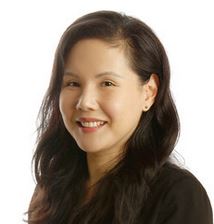

 July bookstore sales rose 5.9%, to $717 million, compared to July 2014, according to preliminary estimates from the Census Bureau. This was the fifth month in a row this year that bookstore sales increased over the comparable month last year. For the year to date, bookstore sales have risen 1%, to $5.6 billion.
July bookstore sales rose 5.9%, to $717 million, compared to July 2014, according to preliminary estimates from the Census Bureau. This was the fifth month in a row this year that bookstore sales increased over the comparable month last year. For the year to date, bookstore sales have risen 1%, to $5.6 billion.
Total retail sales in July rose 3%, to $456.6 billion. For the year to date, total retail sales have risen 2.2%, to $2,963.1 billion.
Note: under Census Bureau definitions, the bookstore category consists of "establishments primarily engaged in retailing a general line of new books. These establishments may also sell stationery and related items, second-hand books, and magazines."
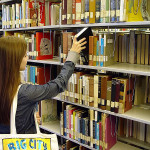 Americans believe that libraries are important community institutions and profess interest in libraries offering a range of new program possibilities, but library visits have edged downward while demands for digital services continue to grow, according to a survey released yesterday by the Pew Research Center, which polled 2,004 Americans ages 16 and older.
Americans believe that libraries are important community institutions and profess interest in libraries offering a range of new program possibilities, but library visits have edged downward while demands for digital services continue to grow, according to a survey released yesterday by the Pew Research Center, which polled 2,004 Americans ages 16 and older.
Some 65% of respondents said that closing their local public library would have a major impact on their community, with 24% saying it would have a minor impact. In addition, 32% said such a closing would have a major impact on them or their family and 33% a minor impact.
Some 46% of respondents had visited a library or a bookmobile in-person during the prior year, compared to 48% who did so in 2013 and 53% in 2012. Library websites were used by 22% (30% in 2013, 25% in 2012); and 27% of those who visited a public library used its computers, Internet connection or wi-fi signal to go online (31% in 2012).
Mobile access to library resources by patrons using a tablet or smartphone is on the upswing. Among those who have used a public library website, 50% accessed it in the past 12 months using a mobile device, up from 39% in 2012. The survey also showed that 30% of respondents (a 10% increase from 2012) said libraries should "definitely" move some print books out to make room for tech centers, reading rooms, meeting rooms and cultural events. And 64% said that libraries should "definitely" have more comfortable spaces for reading, working and relaxing.
"Libraries are undergoing the same disruption as many other institutions in the digital age," said John Horrigan, senior researcher at Pew Research and main author of the report. "These findings show how challenging things are. Libraries' traditional services and 'business model' are valued by many citizens. Yet at the same time, there is a clear public hunger for new programs, more services for key constituencies, and changes in the long-time look and feel of these community spaces."
Other notable findings:
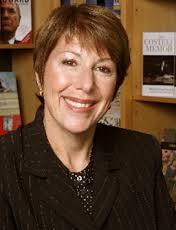 |
|
| Louise Adler | |
Louise Adler, CEO of Melbourne University Press, has been appointed inaugural chair of the Book Council of Australia. The Guardian reported that Attorney General and arts minister George Brandis "made the announcement following heightened pressure on the government to reveal plans for the council, first announced by Tony Abbott at the prime minister's literary awards in December 2014."
"The Book Council will provide advice to the government on strategies to strengthen the profile of Australian literature and literary non-fiction," Brandis said. "It will bring important focus and attention towards promoting Australian writing nationally and overseas; developing and extending audience engagement with Australian literature; and nurturing a vibrant reading and writing culture."
Joining Adler on the council will be the academic David Throsby; managing director of Dymocks bookstores Steve Cox; and Jon Page of Pages & Pages Booksellers, a former president of the Australian Booksellers Association. The Guardian noted that other representatives "would be appointed from a 'wide range of literary and industry organizations,' including the Australian Publishers Association, the Australian Society of Authors, the National Library of Australia and the Small Press Network."
In the Sydney Morning Herald, Adler wrote: "In a naturally competitive trading environment, authors, agents, publishers of all shapes and sizes, printers, booksellers and libraries have worked with successive governments to prepare for the future. That work focused on the consequences of an increasingly global marketplace, the challenge of fair pricing for copyright owners and consumers, rapidly changing reading habits, the proliferation of content platforms, the exportability of Australian writing and the increasing domination of international 'product' in the local market.
"If we collectively believe in the principle that telling our stories to ourselves and to the international market matters as much as it ever did, then fresh thinking is required. The Book Council, with representatives from all the lead organizations involved in the business of reading and writing, has a new opportunity to ensure the community's collective imagination is fueled by Australian writing."
In a tribute for Lori Ellison, an artist and bookseller who died August 1, Karen Lillis, a fellow artist and former bookseller at St. Mark's Bookshop, noted that Ellison was "congenitally a bookstore person" who aimed to work at every independent bookstore in New York City.
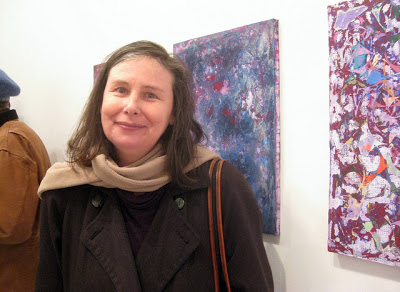 |
|
| Lori Ellison (photo: anaba.blogspot.com) |
|
Writes Lillis: "The first thing to know about this is that working in a bookstore is like being paid to be yourself. You are an avid reader, you have many interests, the interests go into and come out of reading books, and someone pays you to interact with other readers without submerging who you are. There are some tasks you're getting wages for, but you don't have to shoe-horn yourself into some other persona during your work day in order to accomplish them. Your bosses and your coworkers celebrate your interests, or at least the fact that you have interests. In this sense, it goes very well with a life of expression. The difficult thing is making it on a bookstore clerk's salary, which can be half of what the average office worker takes home. Bookstore people don't necessarily like the salary but generally would rather be themselves all day and will sacrifice much to remain employed in the book world.
"I remember associating Lori, for a long time, with her job at Hacker Art Books, a renowned fifth floor bookstore on 57th Street. Seymour Hacker had one of the largest collections of art books in the world and specialized in antiquarian books and rare finds. He had been raised as a bookseller on New York's famed Book Row, and that put his employees in a higher category of bookstore clerk in my mind: 'old school,' 'knows her [stuff].' After Hacker, Lori worked at Posman's Books off Washington Square Park. Posman's was a well-regarded general retail bookstore with a strong philosophy selection. They weren't as punk-Marxist as St. Mark's Bookshop but catered to a more academic side of the NYU crowd. Later Lori followed one of her Posman coworkers to Labyrinth, a serious bookshop up near Columbia that predated Book Culture. At some point she had worked at the notorious Gotham Book Mart uptown, at the always-hiring Strand Bookstore near Union Square, and at Pageant Books (formerly of Book Row) on West Houston–as well as independent bookstores in Richmond and Austin. Back on Bedford Avenue, it was common for me to find her thumbing through design monographs at Spoonbill & Sugartown or checking out Eastern Philosophy titles across the street at Clovis Press."
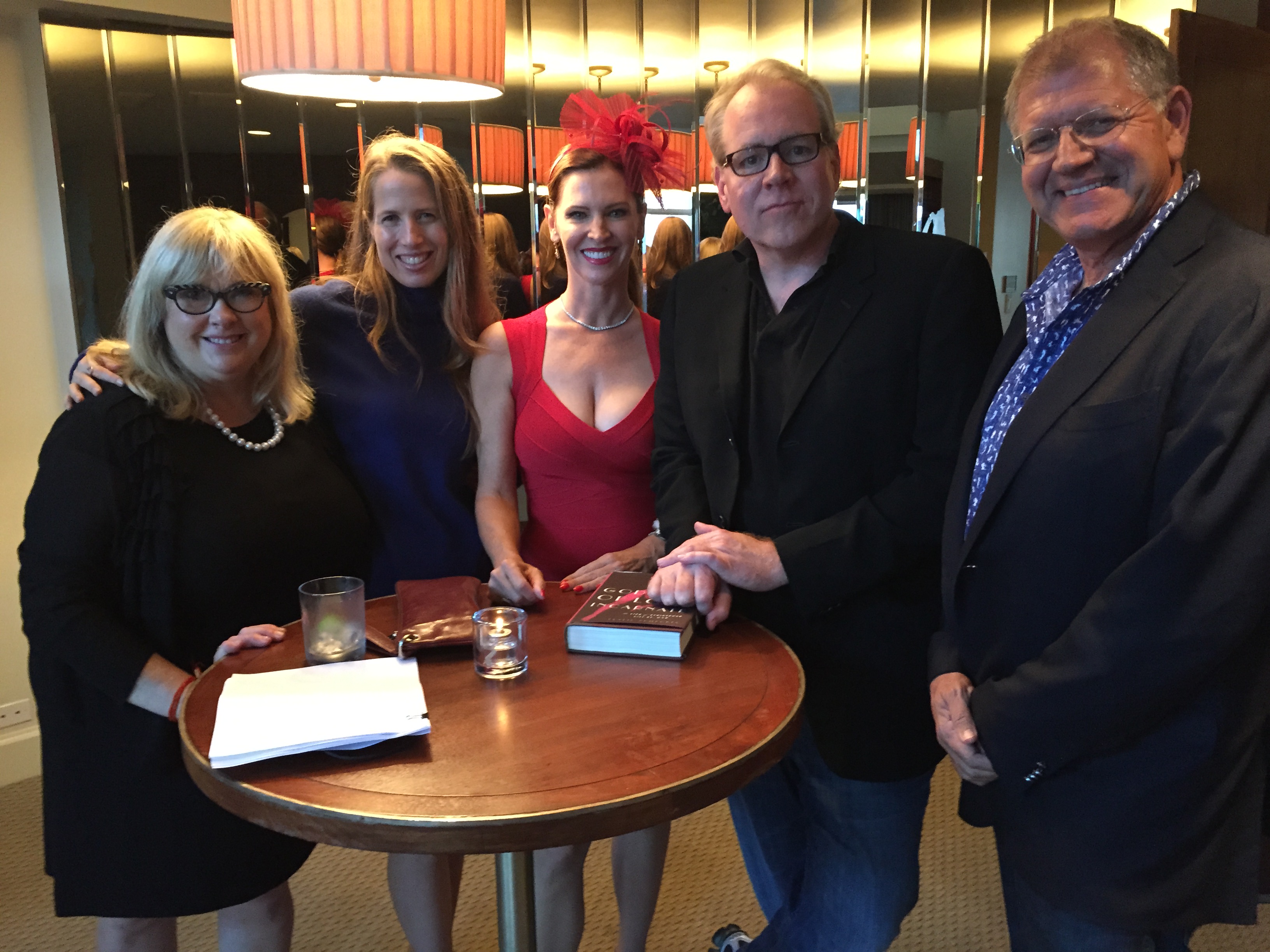
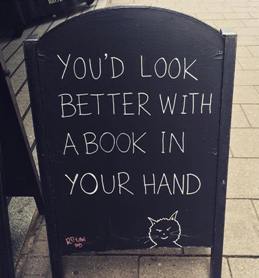 "You'd look better with a book in your hand." Buzzfeed showcased "21 signs that prove booksellers are the absolute best."
"You'd look better with a book in your hand." Buzzfeed showcased "21 signs that prove booksellers are the absolute best."
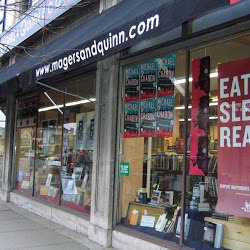 Since its opening in 1994, Magers & Quinn Booksellers in Minneapolis, Minn., has adapted to a rapidly changing industry by evolving, reported the Minnpost. Beginning as a used bookstore, Magers & Quinn eventually expanded its inventory to include not only new books but also remainders. According to Denny Magers, the store's owner, those three categories of books contribute equally to about 70% of the store's total sales. The remaining 30%, meanwhile, is made up of online sales.
Since its opening in 1994, Magers & Quinn Booksellers in Minneapolis, Minn., has adapted to a rapidly changing industry by evolving, reported the Minnpost. Beginning as a used bookstore, Magers & Quinn eventually expanded its inventory to include not only new books but also remainders. According to Denny Magers, the store's owner, those three categories of books contribute equally to about 70% of the store's total sales. The remaining 30%, meanwhile, is made up of online sales.
"A lot of bookstores have closed in the past 10 years for various reasons. First were the big-box stores, then along came the Internet, and there's electronic books now," Magers told the Minnpost, noting that despite the industry's turbulence his sales have still grown in recent years.
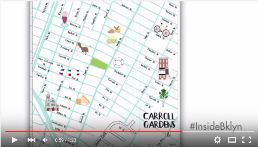
Today on Fresh Air: Paul Vallely, author of Pope Francis: The Struggle for the Soul of Catholicism (Bloomsbury USA, $30, 9781632861153).
---
Tomorrow morning on CBS This Morning: Kunal Nayyar, author of Yes, My Accent Is Real: And Some Other Things I Haven't Told You (Atria, $26, 9781476761824).
---
Tomorrow on Diane Rehm: David Lagercrantz, author of The Girl in the Spider's Web (Knopf, $27.95, 9780385354288).
---
Tomorrow on the Steve Harvey Show: Alan C. Fox, author of People Tools for Love and Relationships: The Journey from Me to Us (SelectBooks, $16.95, 9781590793565).
---
Tomorrow on Bravo's Watch What Happens Live: David Gregory, author of How's Your Faith?: An Unlikely Spiritual Journey (Simon & Schuster, $26, 9781451651607).
---
Tomorrow on PBS NewsHour: Naomi Klein, author of This Changes Everything: Capitalism vs. the Climate (Simon & Schuster, $16.99, 9781451697391).
Noting that "more than 30 films at this year's Toronto International Film Festival are based on books," a reading list of 15 titles that inspired TIFF 2015 was put together by the CBC Books. The festival runs from September 10 to 20. And Quillblog explored the film festival from a different perspective, asking: "How do literary agents deal with TIFF mayhem?"
The National Book Foundation is unveiling longlists for the 2015 National Book Awards this week, with a category released each day. Finalists will be announced on October 14, and winners named November 18. This year's longlisted titles in the poetry category are:
Catalog of Unabashed Gratitude by Ross Gay (University of Pittsburgh Press)
Scattered at Sea by Amy Gerstler (Penguin)
A Stranger's Mirror by Marilyn Hacker (Norton)
How to Be Drawn by Terrance Hayes (Penguin)
The Beauty by Jane Hirshfield (Knopf)
Voyage of the Sable Venus by Robin Coste Lewis (Knopf)
Bright Dead Things by Ada Limón (Milkweed Editions)
Elegy for a Broken Machine by Patrick Phillips (Knopf)
Heaven by Rowan Ricardo Phillips (FSG)
Mistaking Each Other for Ghosts by Lawrence Raab (Tupelo Press)
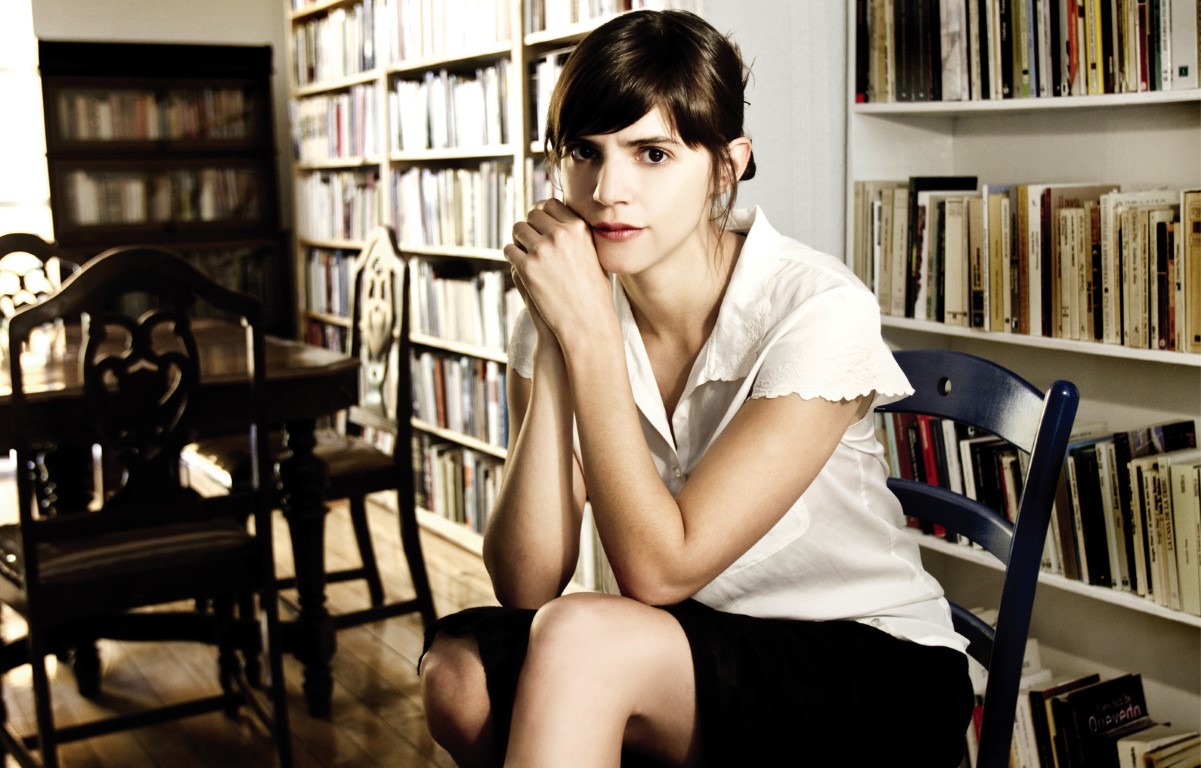 |
|
| photo: Alfredo Pelcastre | |
Valeria Luiselli was born in Mexico City in 1983 and grew up in South Africa. A novelist (Faces in the Crowd) and essayist (Sidewalks), she won the Los Angeles Times Art Seidenbaum Award for First Fiction and the National Book Foundation's 5 Under 35 award. Her new novel, The Story of My Teeth (Coffee House Press, September 15, 2015), is an elegant, witty romp through the industrial suburbs of Mexico City and Luiselli's own literary influences.
On your nightstand now:
There is a pile. Or, really, there are two piles. One has Kathleen Alcott's Infinite Home at the top--the book I will be reading next. Under it is Naja Marie Aidt's Rock, Paper, Scissors; Elena Ferrante's My Brilliant Friend; and Alejandro Zambra's Facsimile. The other pile keeps on changing, but at the top is M.N. Roy's fascinating Memoirs. He was a Bengali Brahmin and a revolutionary activist and writer who, among other things, eloped with an American woman in Palo Alto, escaped prison in New York, and then moved to Mexico City in 1917. There, he founded the Mexican Communist Party--the first Communist party outside Russia. His memoir is a masterpiece (and should be reprinted by someone, as it's almost impossible to find now). I got my copy from a library.
Favorite book when you were a child:
I read and loved José Emilio Pacheco's Battles in the Desert when I was about 11. Then, when I finished reading that, my sister thought I was ready for more, and gave me Alexander Solzhenitsyn's One Day in the Life of Ivan Denisovich. I don't know how much I understood, but I loved staying up late while reading it. It was the only way I was allowed to stay awake past my bedtime.
Your top five authors:
They change. But there are a few that I always return to: Joseph Brodsky, Juan Rulfo, Emily Dickinson, Saint Augustine and Sor Juana Inés de la Cruz.
Book you've faked reading:
Must I, really? Finnegans Wake by James Joyce.
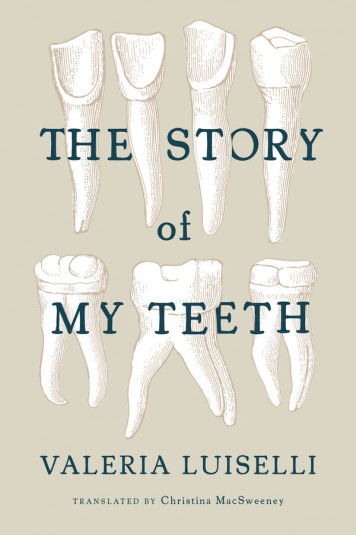 Book you're an evangelist for:
Book you're an evangelist for:
Incidences by Daniil Kharms. Not that it needs my evangelism.
Poemas de terror y de misterio by Luis Felipe Fabre. Ditto.
Book you've bought for the cover:
I easily fall prey to some of New Directions' covers. I bought Nox by Anne Carson, even though I was broke. But Nox was worth it inside and out, of course. I also bought a New Directions book called A Little Ramble, thinking I was buying a strange Robert Walser collection, only to discover, on the subway back home, that it was a kind of homage to Walser, with contributions from several contemporary writers and artists. I was rather disappointed. But it's still one of the loveliest books on my shelves.
Book that changed your life:
The Cantos by Ezra Pound. It taught me to read differently. It was like graduating from two-dimensional geometry to the third or fourth dimensions.
Favorite line from a book:
A line by Emily Dickinson. Technically four lines, but I think they have to be read as a single sentence:
Presentiment--is that long Shadow--on the Lawn
Indicative that Suns do down--
The notice to the startled Grass
That Darkness--is about to pass.
Which character you most relate to:
I have never been able to answer this question. But when I was a child I was maybe in love with Huck Finn.
Book you most want to read again for the first time:
I've never managed to finish Marcel Proust's In Search of Lost Time, so I always start reading it, again, from the beginning, as if for the first time.
The Nest by Kenneth Oppel, illus. by Jon Klassen (Simon & Schuster, $16.99 hardcover, 256p., ages 11-up, 9781481432320, October 6, 2015)
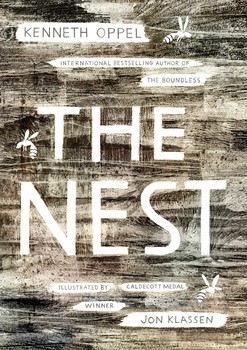 "Nest" is supposed to be a cozy sort of word. It's where animals feel safe enough and comfortable enough to sleep. But nests are not cozy places in The Nest, a chilling nailbiter from Printz Honor author Kenneth Oppel (Airborn), and Steven is having a hard time sleeping in his.
"Nest" is supposed to be a cozy sort of word. It's where animals feel safe enough and comfortable enough to sleep. But nests are not cozy places in The Nest, a chilling nailbiter from Printz Honor author Kenneth Oppel (Airborn), and Steven is having a hard time sleeping in his.
Steven is an anxious boy. He worries about everything, most of all his sickly baby brother, Theo, who has a congenital disease no one can quite figure out. His little sister is endlessly optimistic about the baby's future: " 'And then he'll be all better?' asked Nicole, running her truck back and forth over an action figure." But his parents are a wreck. Meanwhile, Steven is having dreams. At first, he thinks he's being visited in his sleep by gossamer-winged angels, haloed by light. But these angels are no angels. They materialize to Steven as silvery, human-sized wasps: they've decided to replace the sickly Theo with a healthy baby, and they need Steven's help to do it.
Steven goes to a psychiatrist who tells him dreams aren't real, but the wasp queen in his dream proves she is by biting him on the hand... and two small dots are still there in the morning. Things get downright David Lynchian when the gaunt, pincer-handed knife-sharpener guy bangs on Steven's front door when he's the only one home, and leaves a long, curved blade on the doormat. If that isn't quite creepy enough, his little sister's toy telephone actually rings, and the "shrill and raspy" voice of Mr. Nobody is on the other end. But the worst moment of all is when Steven says "Yes" to the wasp queen, not knowing exactly what he's agreeing to do. She replies, '' 'Yes' is a very powerful word. It's like opening a door. It's like fanning a flame. It's the most powerful word in the world." Steven knows he's done the wrong thing, and he feels sick about it.
The wasps offer up the perfect human baby to his family, but Steven realizes that perfection isn't real, not even desirable. Could the wasps "fix" him, too, then? Make him less compulsive and fearful? If they did that, would he still be himself? What would be the cost? The wasps pull Steven into a world that goes even deeper than DNA, burrowing into human existence on a mitochondria-level, like Madeleine L'Engle's A Wrinkle in Time did so many decades ago. Manufacturing "perfection" starts to look sinister indeed, and readers are challenged to examine questions about what "normal" is, and, indirectly, the ethics of genetic engineering, all in the guise of a fantastical thriller.
Caldecott artist Jon Klassen's (This Is Not My Hat, Sam & Dave Dig a Hole) moody graphite illustrations help build the sense of horror, capturing quiet scenes from the eye of an unseen observer: Mom and Dad in a shadowy back corner; standing over Theo's crib; an aerial view of the curved blade on the doormat. Wasps hover over chapter openers in disturbingly increasing numbers as Steven's internal struggle escalates to a full-on, real-life battle for survival. As he says, "It was a bad summer for wasps. Everyone said so." --Karin Snelson, children's editor, Shelf Awareness
Shelf Talker: In Kenneth Oppel's haunting novel, a boy grapples with nightmarish wasps who offer to replace his sickly baby brother with a healthy one.